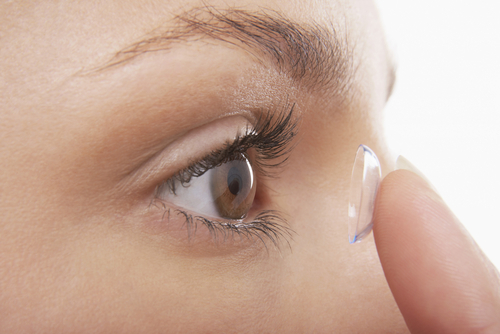
Jump to
Short answer
Contact lenses are generally safe to use. However, if you wear them longer than instructed and/or do not clean them properly, they can cause serious damage to your eyes.
Long answer
If you don’t have perfect 20/20 vision, then you have probably considered (or are already wearing) contact lenses to correct your sight. Contacts are thin lenses that are applied directly to the eye. They are often selected over traditional eyeglasses for numerous reasons: athletics, aesthetics, improved vision correction or just overall convenience.
Modern contact lenses were first introduced back in 1959. And they’ve only grown more popular with each passing decade: the worldwide market for contact lenses was an estimated $6.1 billion in 2010—and $2.1 billion of that was in the U.S. alone.
But are contacts actually safe to wear? Or could they be bad for your eyes?
Fortunately, contact lenses pose a relatively low risk to your overall eye health. However, because they do reduce the flow of oxygen to the cornea of your eye, contact lenses can cause serious damage if wearers do not exercise the proper precautions. For example, improper use of contact lenses can lead to corneal abrasions, infection and even corneal ulcers. Worse yet, some of these issues can lead to a permanent loss of vision.
To reduce your risk of infection and long-term damage, make sure you’re closely following the wear directions of your optometrist or eye doctor. Prescriptions vary, brands change and every eye is different. For these reasons, your doctor is the best person to tell you how long you can safely wear your lenses. Most contact lenses are only meant to be worn for a maximum of 12 hours per day. However, some specialty lenses are made to provide up to 30 days of continuous wear.
Next, make sure you’re cleaning your lenses effectively. Again, this advice should come from your doctor—as different lenses require unique care regimens. However, the American Academy of Opthalmology does offer some general guidelines:
First and foremost, always wash your hands with soap and water prior to applying, removing or handling contacts. This lowers your risk of infection. Next, you should always use sterile solution to rinse and store your contacts; water does not clean them properly. It’s also important to keep your contact case clean and replace it every three months.
Finally, be sure to pay close attention to your eye health and know when to get help. If your eyes become red, bloodshot or irritated, or if your vision becomes blurred, you should remove your lenses and call your eye doctor immediately. Timing makes all the difference: if your contacts are causing an infection or another serious issue with your eyes, you stand a better chance of recovery if it is quickly evaluated and treated by a qualified physician.
Possible short-term side effects
- redness
- irritation
- dryness
- corneal abrasions or ulcers
Possible long-term side effects
- vision loss

Benefits
- corrects vision
- flexible alternative to eye glasses
 Approved by
Approved by 














